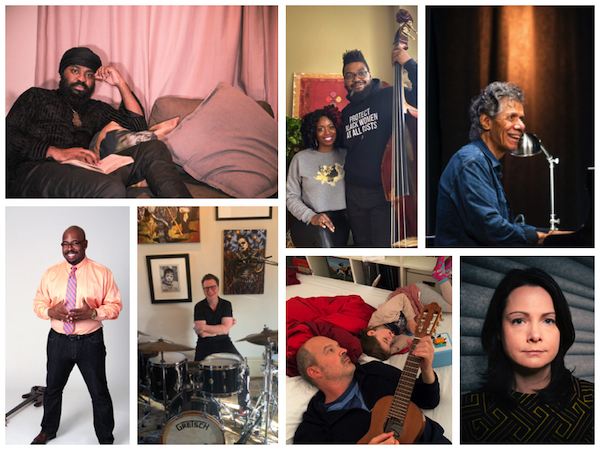Jan 13, 2026 2:09 PM
More Trump-Kennedy Center Cancellations
The fallout from the renaming of the John F. Kennedy Center for the Performing Arts to include President Donald…

Top row from left: Nduduzo Makhathini (Photo: Nailah Makhathini); Brandee Younger and Dezron Douglas at their home in the East Harlem neighborhood of New York City (Photo: Courtesy of Artists); Chick Corea (Photo: Toshi Sakurai, Courtesy Chick Corea Productions). Bottom row from left: Christian McBride (Photo: R. Andrew Lepley); Stanton Moore at his home in New Orleans (Photo: Lauren Del Rio); Wolfgang Muthspiel and his 4-year-old daughter, Flora, at their home in Vienna (Photo: Courtesy of Artist); Kris Davis (Photo: ©Caroline Mardok).
(Photo: DownBeat Collage)“There is definitely gonna be space for alternatives,” Makhathini said. “So, all of these efforts that we’re seeing on social media, it’s definitely something that we can keep going [after the pandemic]. We’ll reimagine the field—‘the field’ meaning the bandstand. There is a particular way in which human beings imagine gathering; there are different registers of how people gather.”
Along with a reassessment of public spaces, the pianist also foresees a realignment of our interior lives and an adjustment in how performers rely on previously established industry norms.
“There is going to be a shift in terms of how people engage the artist after this—and there’s gonna be new relationships with audiences after this,” Makhathini said. “What we have now as an alternative plan will stay as a parallel sort of reality for artists. People are going to be consciously regarding the online [approach] as an option. So, for instance, there’s gonna be people playing stuff from studios and broadcasting from a studio. When I do my next record, I would love to broadcast the session.”
That idea might have seemed revelatory a few years ago—but it could become the norm after the pandemic. An antecedent arrived in 2017, when bassist and vocalist Esperanza Spalding opened up her life to fans while working on Exposure, streaming 77 hours in the studio and emerging with a recording that displayed not just her musical prowess, but also a meta train-of-thought beyond what most musicians were brash enough to attempt.
Becoming stars of their own movies might not actually be a huge leap for some musicians, though. Most already have at least some experience booking gigs, running bands, arranging recordings and negotiating with everyone from label executives to talent agents and publicists. Livestreaming from the studio would only add one more aspect to their careers, and Makhathini believes the creative set contains multitudes.
“[There] is absolutely no differentiation between being a healer, being an artist, being a dancer, being a diviner—all of these things,” Makhathini said. “There is a kind of totality in them.”
As venues, labels and independent performers scramble to find reliable sources of revenue, it still might be too early to envision some grand structural reorganization in jazz that will prove workable after musicians and fans can safely congregate again. But for now, the loss of gigs, studio sessions and teaching opportunities has forced a reckoning with who we are as individuals and as a society, and who and what we value most.
What we think of as the life of a musician could be profoundly different by 2021.
“We already had to have a lot of skills before—but these are extra skills that we have to learn,” Younger said while discussing the outsized role of livestreams in the current jazz ecosystem.
Douglas noted that negotiating the pandemic should prompt musicians to develop some sort of plan for becoming more self-reliant and visible after the world returns to semi-normalcy.
“I have a hustler’s mentality, so whatever [the scene] is going to be, I’m going to be involved in it,” the bassist said, confidently. “Whether the scene, whether my peers, whether they like it or not—they don’t have to. That’s the beauty of art: You don’t have to appreciate everyone’s art. But you can’t deny it.” DB
This story originally was published in the July 2020 issue of DownBeat.

Belá Fleck during an interview with Fredrika Whitfield on CNN.
Jan 13, 2026 2:09 PM
The fallout from the renaming of the John F. Kennedy Center for the Performing Arts to include President Donald…

Peplowski first came to prominence in legacy swing bands, including the final iteration of the Benny Goodman Orchestra, before beginning a solo career in the late 1980s.
Feb 3, 2026 12:10 AM
Ken Peplowski, a clarinetist and tenor saxophonist who straddled the worlds of traditional and modern jazz, died Feb. 2…

The success of Oregon’s first album, 1971’s Music Of Another Present Era, allowed Towner to establish a solo career.
Jan 19, 2026 5:02 PM
Ralph Towner, a guitarist and composer who blended multiple genres, including jazz — and throughout them all remained…

Rico’s Anti-Microbial Instrument Swab
Jan 19, 2026 2:48 PM
With this year’s NAMM Show right around the corner, we can look forward to plenty of new and innovative instruments…

Richie Beirach was particularly renowned for his approach to chromatic harmony, which he used to improvise reharmonizations of originals and standards.
Jan 27, 2026 11:19 AM
Richie Beirach, a pianist and composer who channeled a knowledge of modern classical music into his jazz practice,…